How to Become a Software Engineer Without a Degree
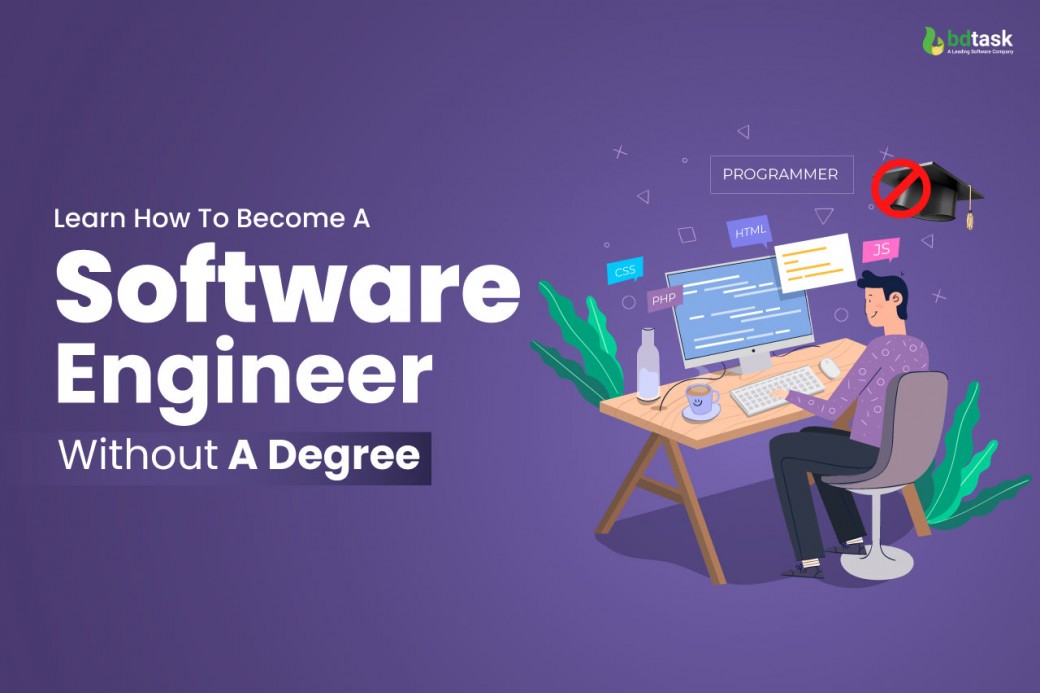
How to become a software engineer without a degree? It's a million-dollar question that many tech professionals ask themselves. Interested in a career in software engineering but don't have a degree? Then you are in the Zone of becoming a software engineer without a degree.
Choosing a career path at a time may seem like a giant leap for some future college students.
It's common thinking that the tech field requires a school certificate.
It's the wrong point of thinking.
Many renowned software engineers and software developers have chosen their way to success without formal degrees.
In today's rapidly evolving tech landscape, a degree is no longer the sole ticket to a successful career in software engineering.
So, if you're passionate about coding and eager to jump on a journey in software engineering, you've come to the right place.
No Degree? No problem
This guide will lead the steps and strategies you need to follow to become a proficient software engineer without needing a traditional degree.
What Is A Software Engineer?
Software engineer designs and develops different computer types of applications, software, and programs. They are the masterminds behind the applications, systems, and software solutions that power our modern world.
A software engineer is a skilled professional designing, developing, and maintaining software applications and systems.
Software engineers are real-life problem solvers, creators, and innovators, continuously pushing the boundaries of what is possible.
Do You Need A Computer Science Degree To Be A Software Engineer
Absolutely no, becoming a software engineer without a formal degree is possible. Many hiring managers have said that fresh graduates must gain skills in writing ready production code. That means they need practical work experience in coding and developing sections.
So, if you are worried about how to become a software engineer without a degree, then you are wrong. All that matters is practical work, and anyone can get practical experience through different platforms.
Anyone with no formal degree but some experience in boot camps and other practical projects is a much more manageable selection for hiring a software engineer.
Steps to be followed to become a software engineer without a degree.
- Complete a Course online
- Perfect Your basics
- Polish Your Coding Skills
- Practice With Coding Projects(in your selected language )
- Network /Find a professional
- Build a nice Portfolio
- Search for Related Jobs
- Practice Your Interview Skills
- Work Towards the Dream Job You Want
Percentage Of Software Engineers Without Degrees
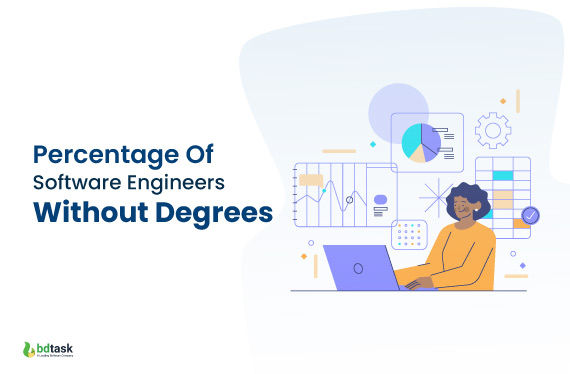
The Stack Overflow 2024 Survey Report shows that only 16% of software developers believe a formal university degree is essential for success. The survey also indicates that among 60,192 responses from self-identified professional developers:
- 45.7% hold a Bachelor’s degree
- 28.4% have a Master’s degree
Instead, 82% of respondents choose online content as their top resource for learning coding. 90% of developers follow technical documentation to start with specific coding tasks.
So, it is somewhat important to have a good level of academic education. But, studying is not an obvious thing to do to become an expert in coding.
5 Free Essential Resources To Become A Software Engineer
If you want to practice some online platforms, here is the list that can help you develop yourself. Learning software engineering online also be a good way to be a software engineer. You must remember one thing: there is no Fastest way to be a software engineer.
1. Coding bat
Coding Bat is a game-changing platform for new coders. Coding Bat is a live coding platform based on Java and Python. The users do not have to download or install any software—the opportunity to practice live content and polish their coding skills.
Anyone can jump right into coding, receive immediate in-browser feedback, and practice solving short, real-world coding challenges.
It's the perfect place to refine your coding prowess.
2. GitHub.Io
Another free platform to learn Git. If anyone has basic knowledge about how to work in Git, it will help them learn challenging concepts.
Challenging concept like
- Branch
- Revert
- Merge
- Cherry-pick
- Rebase and more.
3. Udacity
Udacity might have solid features for beginners, intermediates, and advanced courses. Sometimes, to develop your learning process, it offers some quizzes, tests, and many more sudden exams.
4. Coursera
Coursera is second to none if you are searching for online free courses(1500+) for software engineers and software developers. It is a good choice for beginners. They also offer some advanced-level courses. But for a certificate, you have to do some paid courses. But we will make sure that all the courses are taught and curated by professional subject matters expert.
5. Free Code Camps
If you have coding questions, free code camps are your option. Free code camps offer different free language courses like HTML, CSS, Java, and software engineering.
How To Become A Software Engineer Without A Degree-The Roadmap
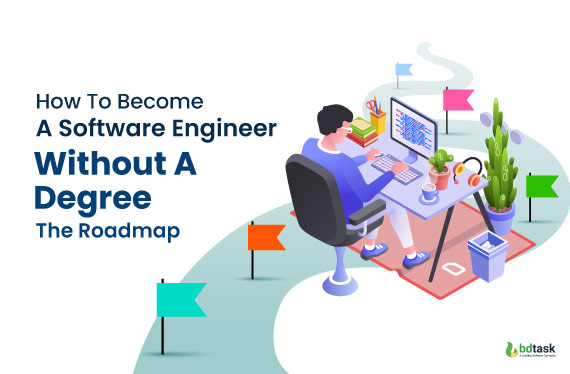
But what if life doesn’t happen to grow that ideally? What if you don’t have the time or resources to afford four years of full-time study?
But honestly speaking, most people don't have the time to sit through some 4 years just for a CS degree. so what's the Roadmap for software engineer?
You may be wondering if I need a degree to be a software engineering software developer. How To Become A Software Engineer Without A Degree
Here is the excellent news for you-
It is possible to be a software engineer without a degree. These steps will guide and show you how to become a software engineer without a degree. So read on.
The Very First Step is a clear mindset about your end goal. A strong mindset helps tremendously hit bumps in the road. something like
- I want to work as a software engineer in a company like Google.
- I want to be a senior software engineer in a top-class software company.
Mindset will motivate you to go ahead when you have a tough time in your preparation time . Because learning to be a software engineer is more challenging with a degree or without. So let's start the journey to learn software engineering.
Follow this Software engineer study plan to be a Software engineer no degree.
1. Choose A Good Software Engineer Language
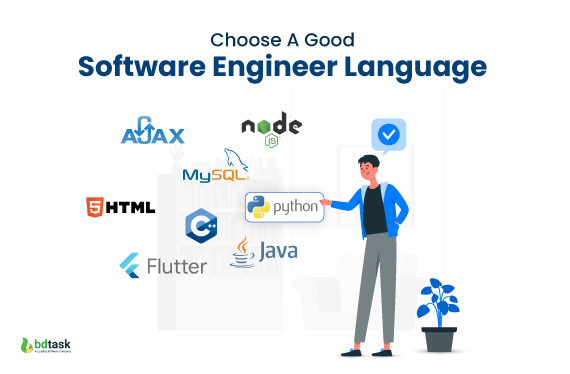
When students or newcomers try to learn a new language, they always get stuck with the same question. How do I learn software engineering as a beginner? how to be a web developer? and what to study to become a software developer.
Ruby on Rails? Django and Python? MEAN stack? There are so many options, It's a lengthy process and we need more time on our hands.
When you learn a particular language or single language, then it's so much easier for anyone.
Learning at least one programming language is important, no matter which field of work you want. ― Ram Ray
What would be your first language to learn if you are new to coding language?
A good learning rule is to start with HTML/CSS and JavaScript. These languages provide a good idea for programming and web development.
If you want to work as a front-end software engineer, then (HTML, CSS, javascript) is essential. Conversely, back-end software engineers need PHP,c++, java, Python, and Node.Js.
So, what should I learn to start as a software engineer career? Python might be an excellent choice for learning a new language.
It's easier, more efficient, and more comfortable than any other language. It's also open source so that you can access plenty of tools for all other sources.
Many well-known companies like (Google, Facebook, X formerly twitter, Netflix, Spotify) use Python language. It's the most flexible language; you can branch out into another language at any time.
2. Online Coding Bootcamps
Your Fast Track to Coding Excellence
Online coding boot camps are used as a weapon. It is a game-changer in the realm of software engineering education.
These intensive and immersive programs help you with the skills and knowledge required to excel in the tech industry.
With courses from web development to data science, you can choose the one that aligns with your interests and career goals. With the talking of career goals, anyone at any age can become a software engineer at 30. Just follow the Roadmap for software engineers.
3. Self-Paced Learning
The Freedom to Craft Your Curriculum
For the self-motivated learner, self-paced learning can be incredibly effective. Different online platforms like Coursera, edX, ExamLabs and Khan Academy offer a brunch of free and paid courses such as CompTIA A+ Practice Tests Dumps and various programming languages and technologies.
The flexibility of self-paced learning allows you to adapt your schedule to your needs, making it ideal for those with busy lifestyles.
4. Sharping Your Programming Skills With Consisting Practice
How to be a good software engineer? How to be a good software developer? The answer is simple. A good software engineer or software developer works hard continuously to develop bug-free software.
The more you practice and study, the better you are.
Suppose you learn many things but need to practice them more regularly. Then what is the point of it? So start practising regularly and effectively.
Just doing 10 hours of practice and good to go? Is it simple to be a software engineer?
Continued practice is the key to being a good software engineer.
There is a proverb that
“Practice makes a software engineer professional.”
5. Use The Real Tools
Free coding courses like Codecademy are great. I agree with this term that all the online platforms are great. But doing only some online courses gives you the vibes of being a software engineer.
If you have to think like a software engineer, work like a software engineer, and use tools like a software engineer.
It will help you to transition into a full-time role and join a team in an actual job field.
- Reals tools like Git or GitHub
- Bitbucket
- The command line interface
GitHub is one of the first sources hiring managers go to evaluate a candidate’s web presence. (Related Read: Software engineer vs. full stack developer -What’s the Difference?)
As a professional, there are so many tutorials on how to use GitHub correctly.
Course to check out
- Coursera also offers a course for it.
- The Ultimate Git Mastery Course
6. Follow Up On The Code Written By Other
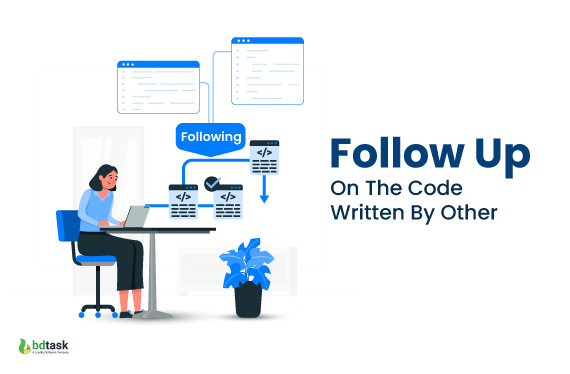
Another important thing is to follow up on the software engineer's written code. And how do you do that?
To do this by browsing through GitHub repositories and reviewing documentation.
Sometimes, documentation may be wrong, but source code never lies. It will help you to find how the actual code works. It's also a good Software engineer study plan. When it comes to debugging, you can identify which code is supposed to be there and which is not. It's a skill that helps you make a strong portfolio.
7. Stay Updated Through Social Media, Podcasts, News
Think Smarter
Nowadays, social media, podcasts, and news is the key source of staying updated on everything. It will immerse you in the world of code. Regularly getting coding news, or what is happening in the coding world, helps to find out what to learn next.
List to follow to get the latest update
- Tech News Briefing(for trendy tech news )
- Techmeme Ride Home ( podcasts)
- TLDR(newspaper )
Beyond that (Twitter, Linkedin, medium, Instagram), you can follow tech leaders to discover the latest news and stories.
8. Do Some Coding Projects
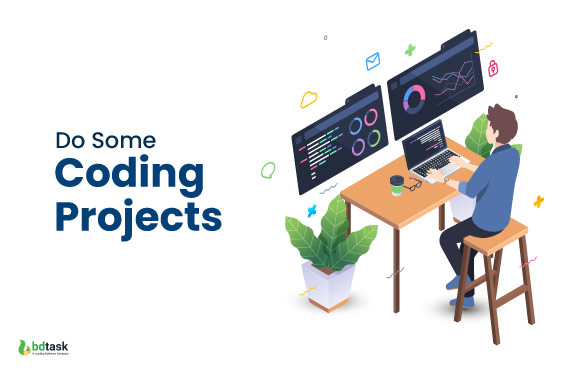
Don't just follow tutorials and watch videos. All the skills you learned in the past are put into use.
Start by working on personal projects that showcase your abilities. Whether it's a mobile app, a website, or a software tool, these projects will hone your skills and serve as evidence of your practical experience.
Project work is a great way to boost your skills.
Select projects that show a branch of skills, such as
- Using standard frameworks/libraries
- Understanding full-stack development
- Creating mobile apps
- Setting up a software development lifecycle environment.
When you create a project
Note it: “A well-written ReadMe file is one of the most important parts of a good repository.”
It will help to learn
- What is the code for
- How to build/install the code
- How to contribute to the project
When contributing to an open-source project, write a detailed commit message explaining why you changed the code. This helps a recruiter assess how well you’ll work on a team.
9. Internship Or Unpaid Jobs
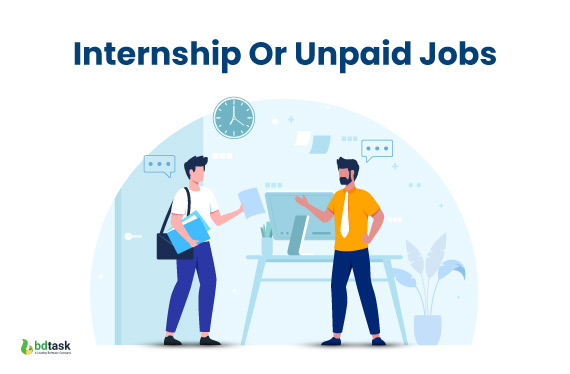
Another good way to make a strong portfolio is to join internship programs or unpaid jobs.
It's a way to gain some practical experience and allow you to work with industry professionals. It will also help you to give a working environment from the very fast stage. An internship is a door that gives you a chance to get a full-time job.
It helps you to find how a professional software engineer's days go, how they deal with deadlines, how they deal with their client, and many more.
10. Finding A Software Engineer Community
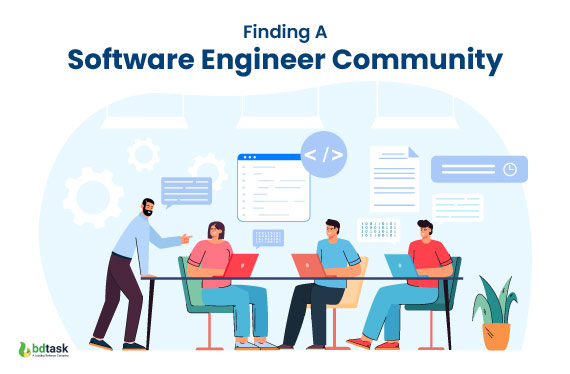
When surrounded by the same working-class people, you feel like you are automatically connected.
In today's tech-driven world, collaboration is critical. Software engineers work closely with cross-functional teams, including designers, product managers, and quality assurance professionals. Effective communication and teamwork ensure the final product meets the client's expectations.
11. Maintain A Professional Tech Network
Doing regular coding is essential for your success. Maintaining a professional tech network also be very important.
According to most surveys and case studies, 25% to 40% of new hires come from employee referrals. A few other ways to continue this tech network
- Go to meet-ups
- Maintains some blogs
- Volunteers
- Speaks some event
- Connection makeup on Linkedin
12. Ready All Your Pre-Interviews Essentials
Before sending out the application for the job, you must prepare three main things.
- Resume
- Cover letters
- Online presence
Even the 2025 resume still matters. A resume is still essential to closely examine your skills and work experience. A cover letter is a needy file if you apply online because it creates an opportunity to grab some attention.
Finally, online presence is more critical than the rest of the two. Your digital footprint matters because HR first searches your name before asking you for an interview.
Here is the list of where you can maintain your online presence
- Linkedin profile
- GitHub
- X (formerly twitter)
- Personal website
Your online presence can set you apart if you’re trying to stand out as a software engineer without a degree.
13. And Now, It Is Interview Time
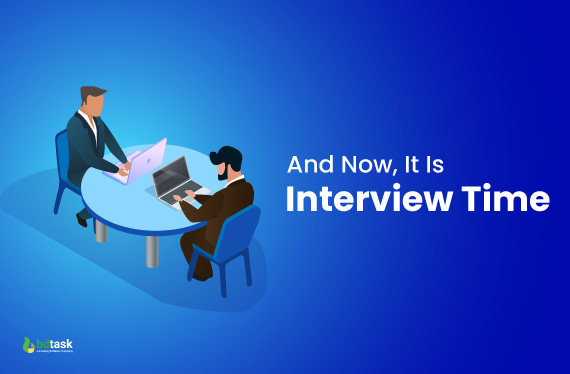
Most of the company take the interview through online. After that comes a phone interview; you'll land the on-site interview if you make it through those two.
You’ll need to be prepared for two types of questions
- Technical questions
- Behavioral questions
After all, you will be asked to build a project through a code challenge or describe how you’ve handled difficult situations.
Some of the resource links down below help you to give you a better idea about the interview.
14. Accept The Job Offer! Be A Software Engineer Without A Degree
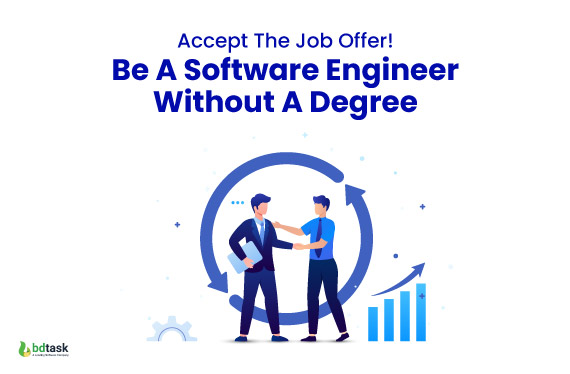
And now, you have to solve the puzzle of how to become a software engineer without a degree. It might be an entry-level software developer job for the first time, but you must start somewhere.
You will get some practical experience and continue to climb the software engineering career ladder to bigger and better positions.
The Finish Line
Learning to be a software engineer might not be the easiest thing, but a complete dedication is all it takes.
With determination and the right approach, becoming a software engineer without a degree is possible.
Can I learn software development on my own?
The path is simple.
You can ensure a successful career in the ever-evolving tech industry by exploring alternative learning paths, building a solid portfolio, networking, and excelling in interviews.
Remember, your passion for coding and continuous learning are your most potent assets on this journey toward software engineering excellence.
And last of all congratulations You successfully now know how to become a software engineer without a degree.
Now it's time for the implementation so Best of luck!!!!!










